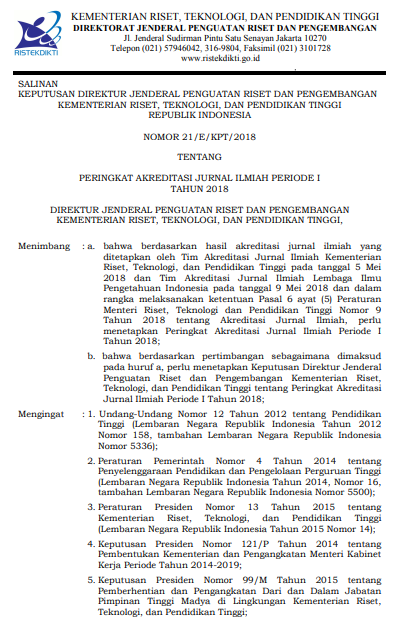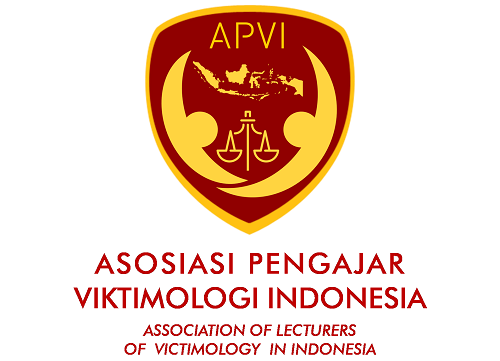THE LEGAL IMPLICATION OF COMPULSORY LICENCE PHARMACEUTICAL PRODUCTS IN THE TRIPs AGREEMENT TO THE PROTECTION OF THE RIGHT TO HEALTH IN DEVELOPING COUNTRIES
Abstract
Compulsory license of pharmaceutical products in the Trade Related Aspects of Intellectual Property Rights (TRIPs) Agreement attempts to balance the interest of patent holders and The right to health. The access of medicines in developing countries for the epidemic diseases, such as, HIV/AIDS medicine is crucial to protect The right to health. The objective of the research is to analyze comprehensively the legal implication of compulsory license for the pharmaceutical product to the protection of The right to health in developing countries. It is a normative juridical research by applying conceptual and comparative approaches. The results of the research shows that: first, the implementation of compulsory licence is in accordance with the international human right law: second, the legal implication of the compulsory license causes the adoption of policy and regulations regarding the protection of the right to health in developing countries, such as Indonesia, Malaysia, Brazil, India and South Africa.
Keywords : Compulsory license, pharmaceutical products, legal implication and The right to health
Full Text:
PDF View
References
Andemariam Senai W, “The Cleft Stick Between Anti Retroviral Drug Patents and HIV/AIDS Victims: An In Depth Analysis of the WTO's Trips Article 31 Bis Amendment Proposal of 6 December 2005’, Intellectual Property Quarterly, Vol.4, 2007, page. 415.
Bazzle Timothy, “Pharmacy of the Developing World: Reconciling Intellectual Property Rights in India With The Right To Health: Trips, India's Patent System and Essential Medicines”, Georgetown Journal of International Law, Vol. 42, 2011, page 788
Bhatt Tina S, Amending Trips: A New Hope For Increased Access to Essential Medicines”, Brooklyn Journal of International Law, Vol. 33, 2008, page 600.
Chuan Feng Wu, “Raising the Right to Health Concerns Within the Framework of International Intellectual Property Law”, Asian Journal of WTO & International Health Law & Policy, Vol. 5, 2010, page 144-145.
__________, “Transnational Pharmaceutical Corporations' Legal and Moral Human Rights Responsibilities in Relation to Access to Medicines”, Asian Journal of WTO & International Health Law & Policy, March 2012.
Collins-Chase Charles T., “The Case Against Trips Plus Protection in Developing Countries Facing Aids Epidemics”, University of Pennsylvania Journal of International Law, Vol.29,Spring 2008.
Cowleya, Emily M. “The Right to Health: Guatemala's Conflicting Obligations Under The Central American Free Trade Agreement and The International Covenant On Economic, Social, and Cultural Rights”, Michigan State University Journal of Medicine & Law, Vol. 11, 2007.
Crook Jamie , “Balancing Intellectual Property Protection With The Human Right To Health”, Berkeley Journal of International Law, Vol. 23, 2005.
Dickhut Sarah M.,“Ethical and Procedural Barriers to Accessing Critical Medicines in Least Developed Countries: A Look at Trips and The Doha Documents, “ Journal of Gender, Race and Justice, Vol.20, Februaary, 2017.
Dontje Anna,” Rethinking Trips: The Future of Pharmaceutical Patents”, Wisconsin International Law Journal, Vol. 33, Fall, 2015.
Erika George, “The Human Right to Health And Hiv/Aids: South Africa and South South Cooperation to Reframe Global Intellectual Property Principles and Promote Access to Essential Medicines”, Indiana Journal of Global Legal Studies, Vol. 38, Winter, 2011.
Guennif Samira and Chaisse Julien, “Present Stakes Around Patent Political Economy: Legal and Economic Lessons from the Pharmaceutical Patent Rights in India”, Asian Journal of WTO & International Health Law & Policy, Vol, 20, March, 2007.
Gupta Raadhika, “ Compulsory Lisencing under TRIPs: How Far it Addresses Public Health Concern in deverloping Nations, Journal of Intellectual Property Rights, Vol. 15, September 2010, New Delhi: Indian National Institute of Science Communication and Information Resource.
Houstona Adam, “A Scientific Approach to Intellectual Property and Health: Innovation, Access, and a Forgotten Corner of the Universal Declaration of Human Rights”, John Marshall Review of Intellectual Property Law, 2014.
Hestermeyer Holger, “Human Rights and the WTO: The Case of Patents and Access to Medicines”, International Trade Law & Regulation, Vol 14, No.6, 2008.
Lazzarinid Zita,2003, “ Making Access To Pharmaceuticals A Reality: Legal Options Under Trips And The Case Of Brazil”, Yale Human Rights and Development Law Journal, Vol.6,2003.
Martins Lilian, “The Right to Health Versus the Right to Property: Conflicts Between Public Welfare and Private Interests, the Brazilian Approach”, Law & Business Review of the Americas, Vol. 20, Summer, 2014.
Mason Meier Benjamin and Mori Larisa M., 2005, “The Highest Attainable Standard: Advancing a Collective Human Right to Public Health”, Columbia Human Rights Law Review, Vol, 37.2005.
Mercurio Bryan, “Resolving the Public Health Crisis in The Developing World: Problems and Barriers of Access to Essential Medicines”, Northwestern University Journal of International Human Rights, Vol. 2006.
Samariadi D,“Pelaksanaan Compulsory Licensing Paten Obatobatanbidang Farmasi Di Indonesia Dikaitkandengan Doha Declaration On The Tripsagreement And Public Health”, De Lega Lata, Volume I, Nomor 2, Juli – Desember 2016,Medan: Fakultas Hukum Universitas Muhammadiyah Sumatera Utara,
Towhidul Islam Mohammad, “TRIPs Agreement and public health: implications and challenges for Bangladesh”, International Trade Law and Regulation, Vol. 17, No.1, 2011.
Weissbrodt David and Schoff Kell, “Human Rights Approach to Intellectual Property Protection: The Genesis and Application of Sub Commission Resolution 2000/7”, Minnesota Intellectual Property Review, Vol.5, 2003.
WTO Doha Ministerial Declaration on the TRIPS Agreement and Public Health, WT/ MIN(01)/DEC/2 (14 Nov. 2001) [hereinafter Declaration on TRIPS and Public Health]; WTO Council for TRIPS, Implementation of Paragraph 6 of the Doha Declaration on the TRIPS Agreement and Public Health, IP/C/W/405 (30 Aug. 2003) [hereinafter WTO, Implementation of Paragraph 6]
Yaminaa Alicia Ely, “ Not Just a Tragedy: Access to Medications as a Right Under International Law”, Boston University International Law Journal, Vol. 21, Fall, 2003.
Yelpaalaa Kojo, “Quo Vadis Wto? The Threat Of Trips And The Biodiversity Convention to Human Health and Food Security”, Boston University International Law Journal, Vol. 30, 2012.
Yua Peter K, “Intellectual Property in International Perspective: Institute for Intellectual Property and Information Law Symposium”, Houston Law Review, Vol.46, 2009.
DOI: http://dx.doi.org/10.20884/1.jdh.2018.18.1.1685
Refbacks
- There are currently no refbacks.
JURNAL DINAMIKA HUKUM Indexed by :
 | Jurnal Dinamika Hukum | |
| Faculty of Law, Universitas Jenderal Soedirman | Copyright of Jurnal Dinamika Hukum | |
| Yustisia IV Building, Law Journal Center | ISSN 2407-6562 (Online) ISSN 1410-0797 (Print) | |
| Purwokerto, Central Java, Indonesia, 53122 | JDH is licensed under a Creative Commons Attribution 4.0 International License | |






